Analysis of the Quality of Diet and Academic Performance in Rural Primary School Students
DOI:
https://doi.org/10.15540/nr.8.1.14Keywords:
academic performance, cognitive health, diet, schoolchildrenAbstract
The aim was to analyze the relationship between the quality of diet and academic performance in rural primary school students, a cross-sectional study made up of 181 rural schoolchildren (8.75 ± 1.79 years) from the island of Fuerteventura. Academic performance was calculated through the average grade in the subjects described in Royal Decree 126/2014, February 28th. The quality of the Mediterranean diet was assessed through the KIDMED questionnaire. The one-way analysis of variance (ANOVA) test did not reflect statistically significant differences in academic performance as a function of the quality of the Mediterranean diet, neither in men nor in women (p > .005). The multinomial logistic regression test after adjusting for sex and age, reflected that schoolchildren with a higher quality of diet were more likely to have passed the areas of Social Sciences and Natural Sciences when compared to their failed peers (p < .05). Thus, a higher quality of the diet in rural primary schoolchildren seems to be associated with passing the areas of Social Sciences and Natural Sciences. Health promotion professionals in the school environment must consider the positive role that diet can play in academic performance and start programs to promote healthy eating among schoolchildren.
References
Alfonso Rosa, R. M., Álvarez Barbosa, F., & del Pozo Cruz, J. (2018). Adherencia a la dieta mediterránea, el rendimiento académico y el nivel de actividad física en edad escolar. Sportis, Scientific Journal of School Sport, Physical Education and Psychomotricity, 4(2), 255–268. https://doi.org/10.17979/sportis.2018.4.2.3108
Attuquayefio, T., Stevenson, R. J., Oaten, M. J., & Francis, H. M. (2017). A four-day Western-style dietary intervention causes reductions in hippocampal-dependent learning and memory and interoceptive sensitivity. PLoS ONE, 12(2), e0172645. https://doi.org/10.1371/journal.pone.0172645
Bleiweiss-Sande, R., Chui, K., Wright, C., Amin, S., Anzman-Frasca, S., & Sacheck, J. M. (2019). Associations between food group intake, cognition, and academic achievement in elementary schoolchildren. Nutrients, 11(11), 2722. https://doi.org/10.3390/nu11112722
Burrows, T., Goldman, S., Pursey, K., & Lim, R. (2017). Is there an association between dietary intake and academic achievement: A systematic review. Journal of Human Nutrition and Dietetics, 30(2), 117–140. https://doi.org/10.1111/jhn.12407
Castells, M. (2008). El reconocimiento internacional de la Dieta Mediterránea como Patrimonio inmaterial: Oportunidades para el turismo gastronómico balear. Boletín Gestión Cultural, 17, 2–16.
Dumuid, D., Olds, T., Martín-Fernández, J.-A., Lewis, L. K., Cassidy, L., & Maher, C. (2017). Academic performance and lifestyle behaviors in Australian school children: A cluster analysis. Health Education & Behavior, 44(6), 918–927. https://doi.org/10.1177/1090198117699508
Eilander, A., Gera, T., Sachdev, H. S., Transler, C., van der Knaap, H. C. M., Kok, F. J., & Osendarp, S. J. M. (2010). Multiple micronutrient supplementation for improving cognitive performance in children: Systematic review of randomized controlled trials. The American Journal of Clinical Nutrition, 91(1), 115–130. https://doi.org/10.3945/ajcn.2009.28376
Esteban-Cornejo, I., Izquierdo-Gomez, R., Gómez-Martínez, S., Padilla-Moledo, C., Castro-Piñero, J., Marcos, A., & Veiga, O. L. (2016). Adherence to the Mediterranean diet and academic performance in youth: The UP&DOWN study. European Journal of Nutrition, 55(3), 1133–1140. https://doi.org/10.1007/s00394-015-0927-9
Estruch, R., & Ros, E. (2020). The role of the Mediterranean diet on weight loss and obesity-related diseases. Reviews in Endocrine and Metabolic Disorders, 21, 315–327. https://doi.org/10.1007/s11154-020-09579-0
Faught, E. L., Ekwaru, J. P., Gleddie, D., Storey, K. E., Asbridge, M., & Veugelers, P. J. (2017). The combined impact of diet, physical activity, sleep and screen time on academic achievement: A prospective study of elementary school students in Nova Scotia, Canada. International Journal of Behavioral Nutrition and Physical Activity, 14(1), 29. https://doi.org/10.1186/s12966-017-0476-0
Faught, E. L., Qian, W., Carson, V. L., Storey, K. E., Faulkner, G., Veugelers, P. J., & Leatherdale, S. T. (2019). The longitudinal impact of diet, physical activity, sleep, and screen time on Canadian adolescents' academic achievement: An analysis from the COMPASS study. Preventive Medicine, 125, 24–31. https://doi.org/10.1016/j.ypmed.2019.05.007
Gandhi, S., & Abramov, A. Y. (2012). Mechanism of oxidative stress in neurodegeneration. Oxidative Medicine and Cellular Longevity, 2012, 428010. https://doi.org/10.1155/2012/428010
García Cantó, E., Carrillo López, P. J., & Rosa Guillamón, A. (2019). Análisis de la dieta mediterránea en escolares de Primaria, Secundaria y Bachillerato (Analysis of the Mediterranean diet in Primary, Secondary and high shool students). Revista Chilena de Nutrición, 46(4), 469–476. https://doi.org/10.4067/S0717-75182019000400469
Garrido-Yserte, R., Gallo-Rivera, M. T., & Martínez-Gautier, D. (2019). Más allá de las aulas: Los determinantes del bajo rendimiento educativo en España y el fracaso de las políticas públicas. International Review of Economic Policy. Revista Internacional de Política Económica, 1(1), 86–106. https://doi.org/10.7203/IREP.1.1.16459
Gimeno Tena, A., & Esteve Clavero, A. (2020). Factores nutricionales y rendimiento académico. Estudio piloto. Ágora de Salut, 7, 127–134. https://doi.org/10.6035/AgoraSalut.2020.7.13
Haapala, E. A., Eloranta, A.-M., Venäläinen, T., Jalkanen, H., Poikkeus, A.-M., Ahonen, T., & Lakka, T. A. (2017). Diet quality and academic achievement: A prospective study among primary school children. European Journal of Nutrition, 56(7), 2299–2308. https://doi.org/10.1007/s00394-016-1270-5
Hassevoort, K. M., Khan, N. A., Hillman, C. H., & Cohen, N. J. (2016). Childhood markers of health behavior relate to hippocampal health, memory, and academic performance. Mind, Brain, and Education, 10(3), 162–170. https://doi.org/10.1111/mbe.12108
Ibarra Mora, J., Hernández Mosqueira, C. M., & Ventura-Vall-Llovera, C. (2019). Hábitos alimentarios y rendimiento académico en escolares adolescentes de Chile. Revista Española de Nutrición Humana y Dietética, 23(4), 292–301. https://doi.org/10.14306/renhyd.23.4.804
Iglesias, Á., Planells, E., & Molina López, J. (2019). Prevalencia de sobrepeso y obesidad, hábitos alimentarios y actividad física y su relación sobre el rendimiento académico (Prevalence of overweight and obesity, exercise, and dietary habits, and their relation with academic achievement). Retos, 36, 167–173. https://doi.org/10.47197/retos.v36i36.66873
Lamas, H. A. (2015). Sobre el rendimiento escolar. Propósitos y Representaciones, 3(1), 313–386. https://doi.org/10.20511/pyr2015.v3n1.74
McIsaac, J.-L. D., Kirk, S. F. L., & Kuhle, S. (2015). The association between health behaviours and academic performance in Canadian elementary school students: A cross-sectional study. International Journal of Environmental Research and Public Health, 12(11), 14857–14871. https://doi.org/10.3390/ijerph121114857
Nathan, N., Yoong, S. L., Sutherland, R., Reilly, K., Delaney, T., Janssen, L., … Wolfenden, L. (2016). Effectiveness of a multicomponent intervention to enhance implementation of a healthy canteen policy in Australian primary schools: A randomised controlled trial. International Journal of Behavioral Nutrition and Physical Activity, 13(1), 106. https://doi.org/10.1186/s12966-016-0431-5
Nyaradi, A., Li, J., Foster, J. K., Hickling, S., Jacques, A., O'Sullivan, T. A., & Oddy, W. H. (2016). Good‐quality diet in the early years may have a positive effect on academic achievement. Acta Paediatrica, 105(5), e209–e218. https://doi.org/10.1111/apa.13324
Nyaradi, A., Li, J., Hickling, S., Foster, J., & Oddy, W. H. (2013). The role of nutrition in children's neurocognitive development, from pregnancy through childhood. Frontiers in Human Neuroscience, 7, 97. https://doi.org/10.3389/fnhum.2013.00097
Parletta, N., Milte, C. M., & Meyer, B. J. (2013). Nutritional modulation of cognitive function and mental health. The Journal of Nutritional Biochemistry, 24(5), 725–743. https://doi.org/10.1016/j.jnutbio.2013.01.002
Pearce, K., Golley, R., Lewis, L., Cassidy, L., Olds, T., & Maher, C. (2018). The apples of academic performance: Associations between dietary patterns and academic performance in Australian children. Journal of School Health, 88(6), 444–452. https://doi.org/10.1111/josh.12631
Portolés Ariño, A., & González Fernández, J. (2015). Rendimiento académico y correspondencias con indicadores de salud física y psicológica. Sportis. Scientific Journal of School Sport, Physical Education and Psychmotricity, 1(2), 164–181. https://doi.org/10.17979/sportis.2015.1.2.1409
Ramón-Arbués, E., Martínez-Abadía, B., Granada-López, J. M., Echániz-Serrano, E., Huércanos-Esparza, I., & Antón-Solanas, I. (2020). Asociación entre la adherencia a la dieta mediterránea y la prevalencia de factores de riesgo cardiovascular (Association between adherence to the Mediterranean diat and the prevalence of cardiovascular risk factors). Revista Latino-Americana de Enfermagem, 28, e3295. https://doi.org/10.1590/1518-8345.3904.3295
Rosa Guillamón, A., García Canto, E., & Carrillo López, P. J. (2019). Capacidad aeróbica y rendimiento académico en escolares de educación primaria (Aerobic capacity and academic performance in primary schoolchildren). Retos, 35, 351–354. https://doi.org/10.47197/retos.v0i35.66769
Sanz Ponce, R., Serrano Sarmiento, Á., & González Bertolín, A. (2020). PISA: El precio pedagógico de una evaluación internacional. Revista Electrónica de Investigación Educativa, 22, e22, 1–13. https://doi.org/10.24320/redie.2020.22.e22.2673
Schwingshackl, L., Morze, J., & Hoffmann, G. (2020). Mediterranean diet and health status: Active ingredients and pharmacological mechanisms. British Journal of Pharmacology, 177(6), 1241–1257. https://doi.org/10.1111/bph.14778
Serra-Majem, L., Ribas, L., Ngo, J., Ortega, R. M., García, A., Pérez-Rodrigo, C., & Aranceta, J. (2004). Food, youth and the Mediterranean diet in Spain. Development of KIDMED, Mediterranean Diet Quality Index in children and adolescents. Public Health Nutrition, 7(7), 931–935. https://doi.org/10.1079/PHN2004556
Sørensen, L. B., Damsgaard, C. T., Petersen, R. A., Dalskov, S.-M., Hjorth, M. F., Dyssegaard, C. B., … Michaelsen, K. F. (2016). Differences in the effects of school meals on children's cognitive performance according to gender, household education and baseline reading skills. European Journal of Clinical Nutrition, 70(10), 1155–1161. https://doi.org/10.1038/ejcn.2016.99
Vassiloudis, I., Yiannakouris, N., Panagiotakos, D. B., Apostolopoulos, K., & Costarelli, V. (2014). Academic performance in relation to adherence to the Mediterranean diet and energy balance behaviors in Greek primary schoolchildren. Journal of Nutrition Education and Behavior, 46(3), 164–170. https://doi.org/10.1016/j.jneb.2013.11.001
Yserte, R. G., Gallo-Rivera, M. T., & Martínez-Gautier, D. (2020). ¿Cuáles son y cómo operan los determinantes del fracaso escolar? Replanteando las políticas públicas para el caso de España y sus regiones. RICEG, Revista Internacional de Ciencias del Estado y de Gobierno, 1(4), 509–540.
Downloads
Published
Issue
Section
License
Authors who publish with this journal agree to the following terms:- Authors retain copyright and grant the journal right of first publication with the work simultaneously licensed under a Creative Commons Attribution License (CC-BY) that allows others to share the work with an acknowledgement of the work's authorship and initial publication in this journal.
- Authors are able to enter into separate, additional contractual arrangements for the non-exclusive distribution of the journal's published version of the work (e.g., post it to an institutional repository or publish it in a book), with an acknowledgement of its initial publication in this journal.
- Authors are permitted and encouraged to post their work online (e.g., in institutional repositories or on their website) prior to and during the submission process, as it can lead to productive exchanges, as well as earlier and greater citation of published work (See The Effect of Open Access).











